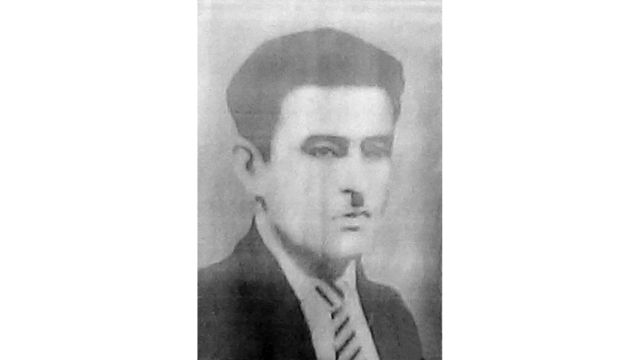Memtili Tewpiq. Credits.
A brave and crucial voice for Uyghur education, he became a target of warlord Sheng Shicai and his Soviet allies.
Abdurehim Gheni Uyghur
Bitter Winter, 06/06/2025
Last week, on May 30th, 2025, the Uyghur diaspora commemorated the 88th anniversary of Uyghur modern educator, poet, and composer Memtili Tewpiq’s (1901–1937) burning to death. I mourn this great Uyghur scholar with the utmost respect and sorrow.
He was born in Buyamet village, Atush. His father was a well-known Uyghur traditional physician, and his family placed great importance on modern scientific education. He lived during a time of widespread oppression and a ban on education imposed by the local warlord Sheng Shicai. His father sent him to the only available modern science school when he was eight years old, ensuring he wasn’t left uneducated. There, he developed a strong interest in contemporary science and gained a broader perspective of the world with the help of his thoughtful tutor.
After finishing school in 1920–1921, he traveled with his father to Ili, Bortala, and Chochek. There, he met uneducated ordinary people and experienced their lives, realizing that the Uyghurs had been deliberately kept uneducated. Consequently, he was determined to intensify his efforts to study and educate others in modern knowledge.
Later, he wrote numerous patriotic poems and exposed the brutality of the ruler at that time to awaken the nation. As his popularity grew, Sheng Shicai saw him as a threat and conspired to imprison him like other social figures. His tutor, Murat, recognized his potential and assisted him in escaping abroad for further education.
In 1926, Memtili fled East Turkestan for Turkey with help from others. He traveled through Crimea, spending two years there before finally arriving in Istanbul in 1928. While studying and living in Istanbul, he gained respect as an intellectual by working diligently and connecting with fellow scholars.
He had always been worried about the fate and future of the Uyghurs. Therefore, he returned to East Turkestan upon learning that the Qumul Revolution (1931–1934) had erupted and spread throughout East Turkestan in opposition to Chinese invaders. He realized that the time had come, and it was essential to educate the Uyghur people in modern science to liberate them from oppression and rise against the brutal regime.
After his return, he opened 24 modern primary schools in 24 villages throughout Atush and launched an unprecedented educational initiative.
In 1934, the political landscape in East Turkestan shifted as Joseph Stalin backed Sheng Shicai against the Uyghurs. However, Mahmut Muhiti, the commander of a Uyghur army, maintained control over Kashgar city and its surrounding areas. Consequently, he effectively implemented the educational renaissance initiative in Atush from 1935 to 1937.

In 1935, Memtili led hundreds of students dressed in school uniforms to advocate for the benefits of scientific education in Payziwat, Toqquzaq, Upal, Tashmiliq, Yeghisar, and Kashgar. Mahmut Muhiti backed this initiative.
Memtili wrote many patriotic poems and dastans, such as “Knowledge makes you great.” However, after Mahmut Muhiti fled to India, the political situation in Kashgar grew more critical, and oppressive measures intensified.
Sheng Shicai targeted popular social figures, wealthy individuals, and those with progressive political views. Memtili, determined to educate people about modern science, made significant contributions but was arrested in his classroom while teaching and taken to jail on May 4, 1937. Fearing an educational renaissance in East Turkestan, Stalin sent three high-ranking spies there, placing them in police stations to eliminate all political leaders and gather information about the situation.
Memtili became their target. While in the dungeon, he inscribed two lines of poetry on the dungeon walls using his blood, expressing his deep determination and anguish: “My blood boils with indignation every day, a brick finishes for writing my sorrow and disobey.”
On 30th May, 1937, Kadir Aji, a traitor who worked for Stalin and Sheng Shicai, set fire in the dungeons and burned more than three hundred people alive, including Memtili.

